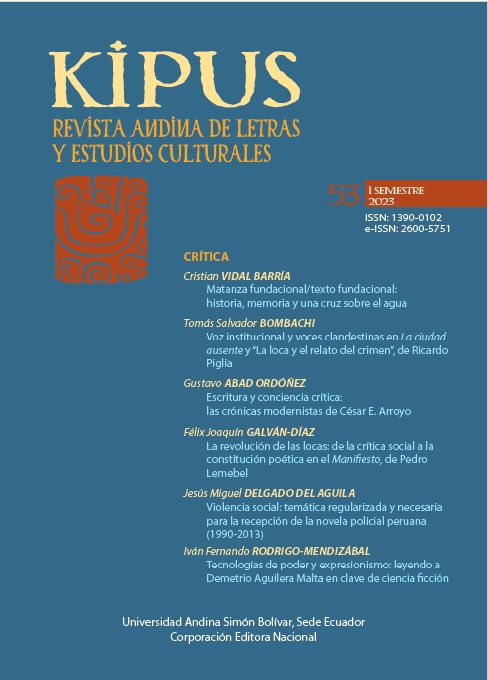Ayllu: Tensions in the Literature and Politics of the Andes
DOI:
https://doi.org/10.32719/13900102.2023.53.7Keywords:
literature, culture, politics, anthropology, sociology, community, philosophy, Andes, indigenism, educationAbstract
This essay explores the Andean concept of ayllu, its importance, function and evolution in the fields of literature, culture, politics, anthropology and sociology. The writer Inca Garcilaso de la Vega gives us a clear idea of the meaning of this concept in Comentarios
reales (1609) as a communitarian philosophy and the importance it had in the period of the Conquest. However, this study seeks to broaden the knowledge we so far have of this concept and generate a discussion to expand the concept beyond the field of ethnography or anthropology. The concept of ayllu has touched all spheres of life of Indigenous peoples in the Andes, especially in Ecuador, Bolivia and Peru, and has been represented in indigenist literature, which also prompted the First Inter-American Indigenist Congress in 1940, public policies on education, culture, health, etc., in all the countries involved, and has also been the axis of government policies such as sumak kawsay in Ecuador and sumaq qamaña in Bolivia. Today, the concept of ayllu continues to
generate discussions around culture, politics and education, making it a topic that should be permanently analyzed in academic and cultural spaces.
Downloads
References
Arnold, Denise Y., y Juan de Dios Yapita. 2003. “Reforma educativa y pueblos indígenas en Bolivia: retórica y práctica”. Guaraguao 7 (17): 49-70.
Cajete, G. A. 2011. “New World of Indigenous Resistance: Noam Chomsky and Voices from North, South, and Central America (review)”. The American Indian Quarterly 35 (2): 274-5.
Calvo Pérez, Julio. 2003. “La política lingüística en el Perú como paradigma de la Educación Intercultural Bilingüe (EIB)”. Guaraguao 7 (17): 27-48.
Castro Pozo, Hildebrando. 1924. Nuestra comunidad indígena. Lima: El Lucero.
–––. 1936. Del ayllu al cooperativismo socialista. Lima: Jirón Puno.
Cornejo Polar, Antonio. 1980. “La novela indigenista: una desgarrada conciencia de la historia”. Lexis 4 (1): 77-89.
De la Torre, Luz María, y Carlos Sandoval Peralta. 2004. La reciprocidad en el mundo andino: el caso del pueblo otavalo. Quito: Abya-Yala.
“El Primer Congreso Indigenista Interamericano”. 1940. Boletín Bibliográfico de Antropología Americana (1937-1948) 4 (1): 1-36.
Espinoza, Baldemar. 1973. La destrucción del Imperio de los incas: la rivalidad política y sensorial de los curacazgos andinos. Lima: Retablo de Papel.
Garcilaso de la Vega, Inca. 2008. Comentarios reales. Madrid: Cátedra.
Giraudo, Laura, y Stephen E. Lewis. 2012. “Introduction: Pan-American Indigenismo (1940-1970): New Approaches to an Ongoing Debate”. Latin American Perspectives 39 (5): 3-11.
Jaramillo Alvarado, Pío. 1922. El indio ecuatoriano: contribución al estudio de la sociología nacional. Quito: Editora Quito.
Mallon, Florencia E. 1983. The Defense of Community in Peru’s Central Highland: Peasant Struggle and Capitalist Transition, 1860-1940. Nueva Jersey: Princeton University Press.
Marroquín, Alejandro Dagoberto. 1972. Balance del indigenismo. Informe sobre la poli?tica indigenista en Ame?rica. Ciudad de México: Instituto Indigenista Interamericano.
Mariátegui, José Carlos. 2002. Siete ensayos de interpretación de la realidad peruana. Ciudad de México: Era.
Meyer, L., y Benjamín Maldonado Alvarado, editores. 2010. New world of indigenous resistance: Noam Chomsky and voices from North, South, and Central America. San Francisco: Open Media Book.
Muyolema, Armando. “Muchas leyes, poco Estado de derecho. A propósito del Consejo Plurinacional del Sistema de Educación Intercultural Bilingüe. https://www.academia.edu/15521203/Muchas_leyes_poco_estado_de_derecho.
Ordoñez Rosales, Paola Brunet. 2013. “El derecho a la Educación Intercultural Bilingüe (EIB) de las comunidades nativas del Perú”. Pensamiento Constitucional 18 (18): 429-46.
Ortiz Crespo, Gonzalo. 2015. “25 años del levantamiento indígena”. PlanV. 01/06/http://www.planv.com.ec/ideas/ideas/25-anos-del-levantamientoindigena/pagina/0/1.
Plasencia Soto, Rommel. 1995. “Reafirmación del orden: ayllus, varayos y matrimonio en Huayllay (Huancavelica)”. Anthropologica del Departamento De Ciencias Sociales 13 (13): 187-204.
–––. 2013. “El reverso de la conquista: relaciones aztecas, mayas e incas”. Investigaciones sociales 17 (31): 253-7.
Prada González, Manuel, et al. 2003. Free Pages and Other Essays: Anarchist Musings. Nueva York: Oxford UP.
Rodríguez-Luis, Julio. 1990. “El indigenismo como proyecto literario: revaloración y nuevas perspectivas”. Hispamérica 19 (55): 41-50.
Rowe, William. 1999. “De los indigenismos en el Perú: Examen de argumentos”. Inti, n.º 49/50: 231-9.
Sacoto, Antonio. 2006. Indianismo, indigenismo y neoindigenismo en la novela ecuatoriana. Quito: Gemagrafic.
Santana, Roberto. 1992. “Actores y escenarios étnicos en Ecuador: el levantamiento de 1990”. Caravelle (1988-), n.º 59: 161-88.
Sicilia, Luis. 2007. José Carlos Mariátegui, un marxismo indígena. Buenos Aires: Capital Intelectual.
Downloads
Published
How to Cite
Issue
Section
License

This work is licensed under a Creative Commons Attribution-NonCommercial-ShareAlike 4.0 International License.







.png)
